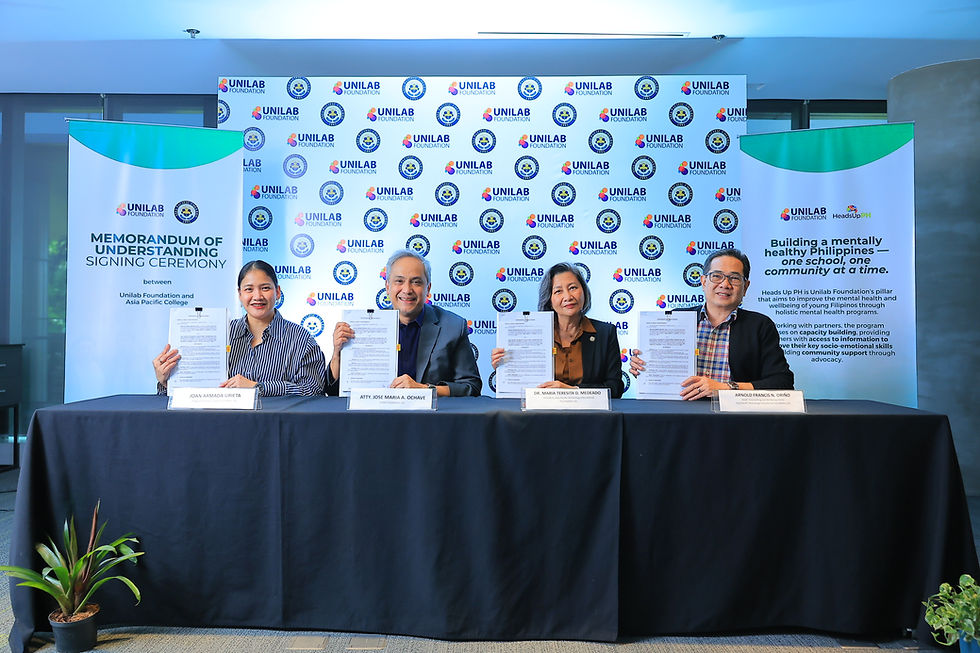National Center for Mental Health, Unilab Foundation and Partners Launch School Referral System
- Kyllie Capacio
- Nov 11, 2025
- 4 min read

The state of mental health of Filipino learners is a pressing concern that demands immediate attention. Recent data from a peer-reviewed study published in Cambridge Prisms: Global Mental Health of the Cambridge University Press in April reveal a significant rise in youth mental health concerns, citing that moderate to severe depressive symptoms (MSDS) among Filipinos age 15 to 24 years old rose from 9.6% in 2013 to 20.9% in 2021.[1]
The National Center for Mental Health’s (NCMH) crisis hotline has received four times more calls since the pandemic, with suicide-related calls increasing from 10% pre-pandemic to 35% in recent years, with most callers coming from the 18 to 30 years old age group.
“Through the years, especially after the pandemic, we’ve seen a surge in students struggling with emotional and behavioral symptoms, and school-related stress affecting performance,” said Dr. Kristine Elaine Abary, Medical Officer IV and Child and Adolescent Psychiatrist at the NCMH, and co-author of the Heads Up Connect.
Turning Datapoints into Action
In the pilot implementation of the Children and Adolescent Risk Screener (CARS), a universal screening tool by the Unilab Foundation piloted in 16 public schools from 2024-2025, nearly 3,000 out of 23,000 learners were identified to be at high risk.
“This is approximately 1 out of 10 learners found to be at high risk. Those identified are found to show alarming signs of suicidal ideation, self-harm ideation, and profoundly poor coping mechanism,” shared Marie Joan Armada-Urieta, Program Director of Heads Up PH at Unilab Foundation (ULF). She continued, “Our goal is to ensure that the initial identification is not an end in itself but a direct pathway to sustained and specialized support.”
Amid this alarming trend, NCMH, ULF, and partner Department of schools are launching The Heads Up Connect: Integrative-Collaborative School Mental Health Program that is grounded in a multi-tiered framework that promotes well-being for all learners, identifies those at risk, and provides specialized clinical support when needed to ensure that no learner falls through the cracks. The vision is to build a stronger linkage between classrooms and clinics through an evidence-based school referral system that detects and supports students in distress. Moreover, this partnership aims to establish a replicable, school-linked referral model that strengthens coordination among educators, parents, and healthcare providers.
“Building on ULF’s work in early identification and management of students at risk, our current initiative with the NMCH strengthens the referral pathway, seamlessly connecting students identified as "at-risk” to focused care from mental health professionals,” said Armada-Urieta. “Our collaboration with DepEd and NCMH is not only relevant but timely and urgent.”

“Our teachers and school staff are often the first to see warning signs. With the goal of minimizing delays, this pilot school referral initiative aims to ensure students receive the support they need when they need it most,” said Atty. Jose Maria A. Ochave, Executive Director of ULF.
Heads Up Connect also emphasizes the important role educators play in ensuring the sustainability of referral.
“Studies show that treatment is six times more likely to be completed when offered through schools. Teachers, parents, and mental health professionals must work hand in hand,” shared Dr. Kenneth Javate, a Fellow of the Philippine Psychiatric Association and the Philippine Society for Child and Adolescent Psychiatry, Consultant Director at the Center for Behavioral Health of the Medical City, and Lead Author of Heads Up Connect and the ULF’s suicide-prevention toolkit in schools called RACE Against Suicide.

“By strengthening school-based partnerships, we can identify and support students early, reduce hospitalizations, and help them thrive academically and emotionally,” added Dr. Abary.



[1] Puyat JH, Salvador DL, Tuazon AC, Afable SD. Rising prevalence of depression and widening sociodemographic disparities in depressive symptoms among Filipino youth: findings from two large nationwide cross-sectional surveys. Glob Ment Health (Camb). 2025 Apr 14;12:e51. doi: 10.1017/gmh.2025.39. Erratum in: Glob Ment Health (Camb). 2025 Jun 09;12:e55. doi: 10.1017/gmh.2025.10019. PMID: 40438418; PMCID: PMC12116253.




Comments